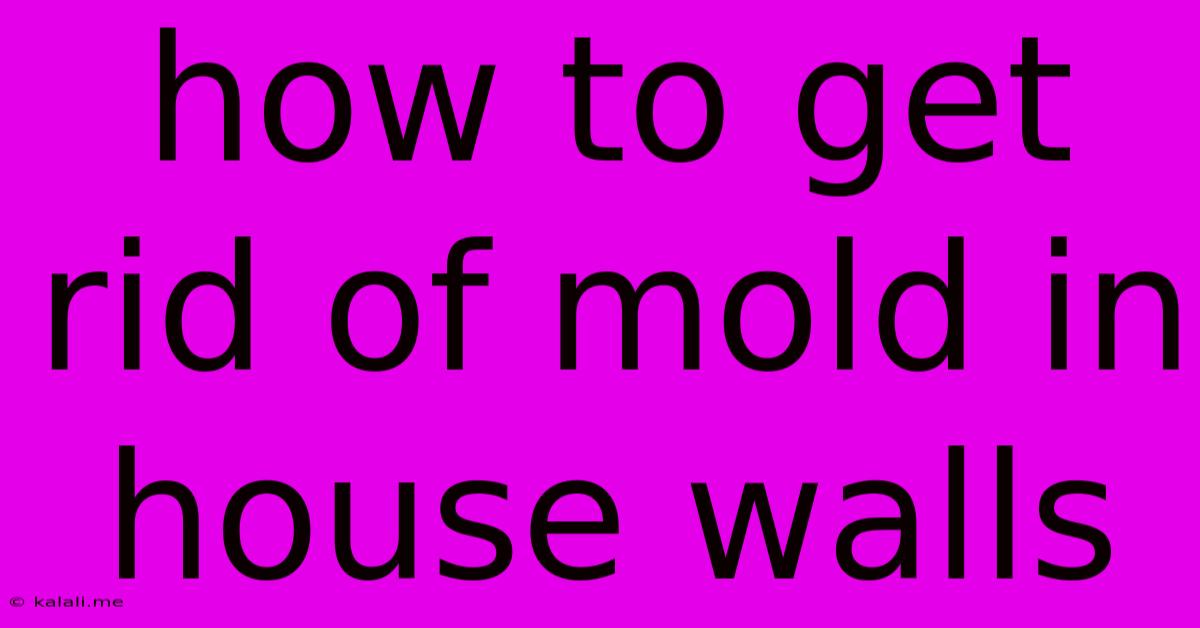How To Get Rid Of Mold In House Walls
Kalali
Jun 06, 2025 · 3 min read

Table of Contents
How to Get Rid of Mold in House Walls: A Comprehensive Guide
Mold in house walls is a serious issue, impacting both the structural integrity of your home and the health of its occupants. This guide provides a comprehensive approach to mold removal, from identifying the problem to preventing future growth. We'll cover everything from safe cleaning techniques to when you need to call in professional help. Ignoring mold can lead to significant health problems and costly repairs, so tackling it effectively is crucial.
Identifying Mold and Assessing the Severity
Before you start cleaning, you need to accurately identify and assess the extent of the mold problem. Mold often presents as discoloration—black, green, gray, or brown patches—on walls, ceilings, or around windows. It might also have a musty odor. A small, isolated patch is manageable with DIY methods, but extensive or deeply embedded mold requires professional remediation.
Consider these factors when assessing severity:
- Size of the affected area: A small patch (less than 10 square feet) is usually manageable at home. Larger areas indicate a more serious problem.
- Type of mold: Some molds are more toxic than others. If you are unsure about the type of mold, it’s best to consult a professional.
- Location of the mold: Mold in areas with high moisture content, like bathrooms or basements, is more likely to recur.
- Your health concerns: If you or anyone in your household has allergies or respiratory problems, it's crucial to address mold promptly and potentially seek professional help.
Cleaning Small Mold Patches Safely
For small mold infestations, you can try these steps:
- Safety First: Wear protective gear, including gloves, goggles, and an N95 respirator mask to prevent inhalation of mold spores.
- Ventilation: Open windows and doors to increase ventilation. Use fans to improve airflow.
- Prepare the area: Cover the floor with drop cloths to protect it.
- Cleaning solution: Mix a solution of one cup of bleach to one gallon of water. Caution: Bleach is a harsh chemical; always follow safety precautions on the label. Alternatively, use a commercially available mold cleaner.
- Apply the solution: Using a scrub brush or sponge, gently apply the solution to the affected area. Avoid scrubbing vigorously, as this can spread spores.
- Rinse thoroughly: Rinse the area with clean water and allow it to dry completely.
- Monitor: Keep an eye on the area for any signs of regrowth.
Addressing the Root Cause of Moisture
Mold thrives in damp environments. Identifying and fixing the source of moisture is crucial to prevent recurrence.
- Leaks: Check for leaks in pipes, roofs, or windows. Repair any leaks immediately.
- Condensation: Improve ventilation in bathrooms and kitchens to reduce condensation. Use exhaust fans and dehumidifiers.
- Poor drainage: Ensure proper drainage around the foundation of your house to prevent water from seeping into the walls.
- High humidity: Use a dehumidifier to reduce humidity levels in your home.
When to Call a Professional
If the mold infestation is extensive, if you suspect toxic mold, or if you're unsure about how to handle the problem, it's best to call a professional mold remediation company. Professionals have the expertise and equipment to safely and effectively remove mold, addressing both the visible mold and the underlying causes of moisture. They will also dispose of mold-contaminated materials properly.
Preventing Future Mold Growth
Prevention is key. By taking proactive steps, you can significantly reduce the risk of mold growth in your home.
- Regular cleaning: Regularly clean and disinfect areas prone to mold growth, such as bathrooms and kitchens.
- Proper ventilation: Ensure adequate ventilation in all rooms, especially bathrooms and kitchens.
- Maintain low humidity: Use dehumidifiers to keep humidity levels low.
- Address leaks promptly: Repair any leaks immediately.
- Regular inspections: Regularly inspect your home for signs of mold growth.
Mold removal requires a comprehensive approach. By understanding the causes of mold growth, employing safe cleaning techniques, and addressing the underlying moisture problems, you can effectively eliminate mold and prevent future infestations, ensuring a healthy and safe living environment.
Latest Posts
Latest Posts
-
How To Hang A Punching Bag
Jun 06, 2025
-
Twitter Password Not Working From Logging With Google
Jun 06, 2025
-
Air Conditioner Drian Too Much Water
Jun 06, 2025
-
Ac Unit Outside Blowing Cold Air
Jun 06, 2025
-
What Is Involved In Upgrading To 200 Amp Service
Jun 06, 2025
Related Post
Thank you for visiting our website which covers about How To Get Rid Of Mold In House Walls . We hope the information provided has been useful to you. Feel free to contact us if you have any questions or need further assistance. See you next time and don't miss to bookmark.